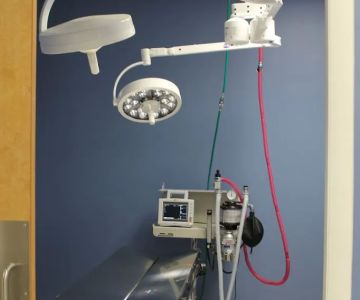What is a VMD Veterinary? Understanding the Role and Path to Becoming a VMD
- 1. What Does VMD Stand For?
- 2. VMD vs DVM: What’s the Difference?
- 3. How to Become a VMD Veterinary
- 4. Career Paths for VMD Veterinarians
- 5. Why Choose a VMD Degree in Veterinary Medicine?
1. What Does VMD Stand For?
When I first heard the term "VMD veterinary," I was curious about what it meant. It turns out that VMD stands for "Veterinary Medical Doctor." This degree is awarded to veterinary professionals who have completed the required education and training to become licensed veterinarians. What’s interesting about the VMD is that it’s awarded by specific veterinary schools, primarily those in the United States, such as the University of Pennsylvania. Essentially, the VMD is the same as the DVM (Doctor of Veterinary Medicine), but the terminology differs depending on the institution.
As I explored the subject further, I discovered that the VMD designation reflects a specific veterinary medical philosophy and approach, especially in terms of the historical roots and educational background. Both VMDs and DVMs are fully qualified to practice veterinary medicine, and their responsibilities are largely the same. However, the differences in titles primarily reflect the traditions of the schools that award the degree. In this article, I’ll explore what being a VMD veterinary involves, how to earn the degree, and why it’s significant in the field of veterinary medicine.
2. VMD vs DVM: What’s the Difference?
One of the most common questions I’ve encountered when discussing veterinary medicine is, “What’s the difference between a VMD and a DVM?” The simple answer is that there is no significant difference between the two. Both VMDs and DVMs are qualified veterinarians who have gone through rigorous training in animal health, anatomy, disease prevention, and treatment. Both degrees allow veterinarians to practice in a wide range of fields, from pet care to large animal medicine.
However, the distinction between VMD and DVM mainly lies in the historical naming conventions. VMD is awarded by a handful of schools, like the University of Pennsylvania, while DVM is awarded by other veterinary schools, such as the University of California, Davis, and Cornell University. In fact, both degrees are equivalent in terms of the veterinary profession and licensing requirements. The curriculum, training, and career outcomes for VMD and DVM veterinarians are virtually identical.
3. How to Become a VMD Veterinary
Becoming a VMD veterinarian involves several steps. Like all aspiring veterinarians, the journey begins with obtaining an undergraduate degree. Most veterinary schools, including those that award the VMD, require applicants to have a bachelor's degree with courses in biology, chemistry, physics, and animal science. After completing undergraduate studies, prospective veterinarians must apply to veterinary school, where they will complete a four-year program focused on veterinary medicine.
The veterinary school curriculum typically includes both classroom instruction and clinical training. The first two years are spent learning foundational topics such as anatomy, physiology, pathology, pharmacology, and microbiology. In the final two years, students transition into clinical rotations where they gain hands-on experience by working with real patients under the supervision of experienced veterinarians.
In order to earn a VMD degree, students must graduate from a school like the University of Pennsylvania, which offers the VMD instead of the DVM. After graduation, VMDs, like DVMs, must pass a licensing exam and fulfill continuing education requirements to maintain their professional standing. The total time to become a licensed VMD typically takes around 8 years (4 years of undergraduate education and 4 years of veterinary school).
4. Career Paths for VMD Veterinarians
After earning a VMD degree, the career opportunities are vast. Veterinarians with a VMD can work in a variety of settings, including private practices, animal hospitals, research institutions, and even governmental agencies. The flexibility of the VMD allows veterinarians to specialize in different areas, such as:
4.1. Small Animal Medicine
Many VMDs choose to work in small animal medicine, where they provide care for pets such as dogs, cats, and rabbits. This field allows veterinarians to diagnose and treat a wide range of conditions, from routine check-ups to more complex surgeries.
4.2. Large Animal Medicine
VMDs can also specialize in large animal medicine, treating livestock such as cattle, horses, and pigs. This specialization is essential for the agricultural sector and offers a fulfilling career for those interested in working with farm animals.
4.3. Research and Education
For those interested in advancing veterinary science, a career in research or teaching may be appealing. Many VMDs go on to work in veterinary research, studying diseases, developing new treatments, or advancing veterinary education.
4.4. Emergency and Critical Care
Veterinarians in this field deal with urgent, life-threatening situations. The ability to think on your feet and provide immediate medical care is crucial. VMDs working in emergency medicine often work in animal hospitals or veterinary emergency centers.
5. Why Choose a VMD Degree in Veterinary Medicine?
Choosing to pursue a VMD degree in veterinary medicine can be a rewarding decision for those passionate about animal health and welfare. For me, the VMD degree represented a unique opportunity to learn from a respected institution while specializing in various areas of veterinary care. The advantage of earning a VMD from a prestigious institution like the University of Pennsylvania is that it opens doors to a wide range of career opportunities and provides access to a network of accomplished professionals.
Furthermore, pursuing a VMD degree gives veterinary students access to cutting-edge research and clinical experiences, which are crucial in providing the best care for animals. Whether you want to work with pets, livestock, or exotic animals, the VMD degree provides a solid foundation for building a successful career in veterinary medicine.
For those interested in pursuing a career in veterinary medicine, I encourage you to consider all the opportunities a VMD offers. It’s a fulfilling profession with significant impact on animal health, and the path to earning your VMD is both challenging and rewarding. To learn more about how to pursue a career as a VMD veterinary, explore options at top veterinary schools and see what makes each program unique.











